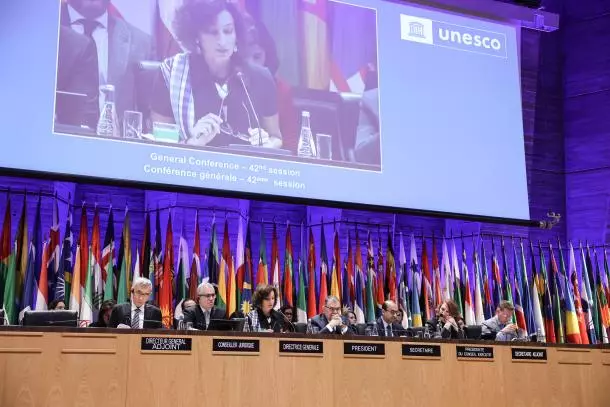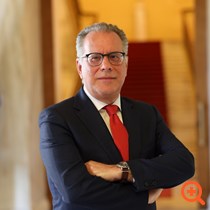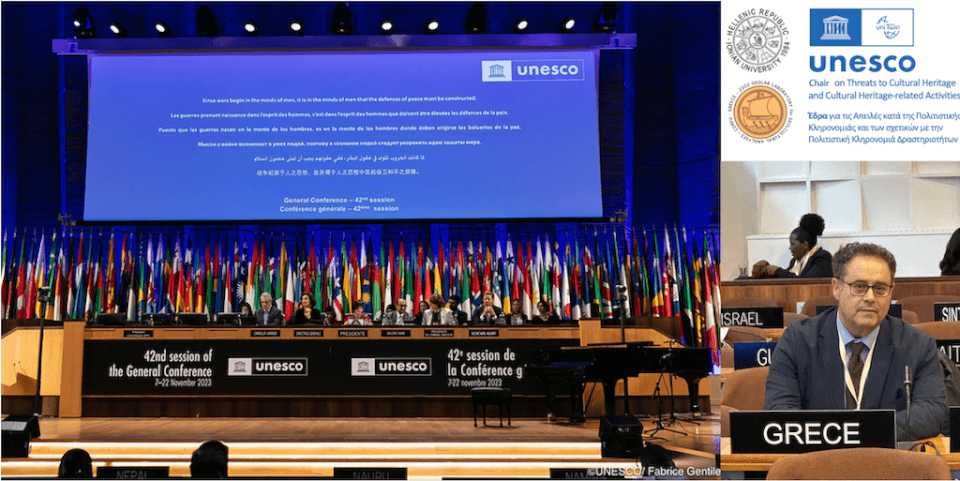"The 42nd session of the UNESCO General Conference represented a showcase to the world of what multilateralism in action means."
Audrey Azulay, UNESCO Director-General
The Conference
Member States adopted the Recommendation on Education for Peace, Human Rights and Sustainable Development. The Recommendation is the only international legal text exclusively focusing on education's role in building societies where learners can lead a life of dignity, in good health, and free from violence. The text updates the "1974" Recommendation that almost 50 years ago united Member States in positioning education as a key driver of peace and international understanding. For the past two years, UNESCO has been revising this visionary tool to ensure it responds to today's greatest challenges and future shocks.
Proposals for communication and information in the digital age adapted to the age of artificial intelligence have also been put forward. Member States decided to launch the preliminary study on the technical and legal aspects relating to the desirability of a standard-setting instrument on the ethics of neurotechnologies - giving UNESCO a clear mandate to draw up a standard - setting instrument on this subject.
During the conference, the Director-General was able to underline that UNESCO's work on water, biosphere, and oceans has been consolidated and that many other initiatives have been put forward to rebuild its relationship with nature. Enabling the launch of the new Biodiversity Portal, which brings together data from over 2000 UNESCO-designated sites, including World Heritage sites, geoparks, and biosphere reserves, to support Member States in achieving internationally agreed biodiversity goals.
During the 42nd session of the General Conference of UNESCO, the 194 Member States approved a historic increase in the Organization's budget (+25%), as proposed by Director General Audrey Azoulay. Through this funding, UNESCO will considerably strengthen its actions in favor of education, science, culture and information throughout the world. Key agreements were also concluded, notably for education, culture and the establishment of a global ethical framework for neuroscience.

The presence of the I.U. UNESCO Chair
The most important area of work was undoubtedly the Culture and Social Sciences Commissions, in which our UNESCO Chair was active, making contacts with several national representatives, including the new Permanent Representative of Greece to UNESCO, Mr. G. Koumoutsakos, exchanging views and texts on the issues with delegates of Latin American, African, and European countries, especially on the issues of combating the illicit trade of antiquities and works of art, locating and recovering them, as well as developing a toolkit for intangible cultural heritage protection.

Mr. George Koumoutsakos, the new Permanent Representative of Greece to UNESCO
The Greek delegation did not present any initiative in the context of either the Culture Commission or the Social Sciences and Humanities Commission. We voted for or supported the initiatives of various countries such as Poland which had already requested during the 18th Session of the Intergovernmental Committee of the 2003 Convention, the declaration of October 17 as "Intangible Cultural Heritage Day" and rather hastily (due to the reservations of some countries led by Germany) the amendment proposed by Nicaragua and Peru on the role of museums in the fight against illicit trade and the recovery of cultural property in accordance with the MONDIACULT declaration of 2022. Greece filed a general statement on the implementation of the 1980 Recommendation concerning the Status of artists, a sector in which the country is far behind in terms of compliance. The Greek Delegation in its keynote statement to the Culture Commission focused exclusively on Greece's determination to address the threat posed by climate change to Cultural Heritage within the framework of the "National Strategy for Climate Change", without reference to any specific action plan and to actual extent of its implementation to date. There was no mention of the issues of returning antiquities or works of art, nor was there any mention of the issues related to the World Heritage List.
Overall, there was a complete lack of coordination between the EU member countries on issues of common interest during the process within the Commissions.
The 42nd General Conference of UNESCO made clear the urgent necessity of the policy-making role that the UNESCO Chairs of the Greek Universities are called upon to fulfill towards the formulation and support of a sustainable national policy in their fields of competence and of the consequent national presence in the framework of UNESCO in analogy to the country's global weight in culture and education issues. It is certain that the placement of Mr. Koumoutsakos as Permanent Representative of Greece to the Organization will give the necessary new impetus to national representation in the critical field of international cultural policy and diplomacy.




 42UNESCOGC_CULTUREcom_Summary
42UNESCOGC_CULTUREcom_Summary











